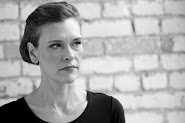This is a selection of lines from this novel by Mary Gaitskill (Pantheon, 2005, Vintage Contemporaries Edition, July 2006). Though the characters are ugly and beautiful, ill and not ill, and the streets are ugly and beautiful, a warm compassion for all of them as people in real places opens up, even when the characters themselves lack compassion. I like to escape while reading into this book partly because the main character, Alison, doesn't write, and I envy her life that way. She goes the long day without writing anything. Of course, Gaitskill writes. Alison works as a model when she is young; later she is on codeine for a bad arm and has hepatitis. The title character, Veronica, has AIDS. I hesitated to read a novel about people with these problems, much the way one might avoid associating with people with these problems. Theirs is not a happy life, yet it is, too, because they lived.
When I lost my looks and had to go on disability, John pitied me and then looked down on me, but that just got fit into the friendship, too. What can't get fit in is that sometimes even now John looks at me and sees a beautiful girl in a ruined face. It's broken, with age and pain coming through the cracks, but it's there, and it pisses him off. It pisses me off, too. (39)
The sweetness of it was a complicated burst of little tastes, but under that was a big broad muscle of sound. It was like the deep feeling of dick inside and the tiny sparkling feelings outside on the clit. Except it was also like when you're in love and not thinking the words dick or clit. (41)
Daphne and I hated Sara for acting like this. But it was hard to hate her all the way. Her rage was like gentleness trapped and driven crazy with sticks. It was flailing and helpless. It made Daphne's measured goodness seem somehow mean. (58)
Then he jumped up and said he wanted to go to a nightclub. But I had go-sees the next day! He laughed and said, "Don't think like a shop girl! Think like a poet!" (69)
The intelligence in his eyes is warm, but it's not the love warmth of the heart. It's from the liver and stomach and glands, the busy warmth of function. He's slow to talk and he says "uhhhh" a lot. It doesn't make him sound stupid. It makes it seem like his thoughts are physical truths that have to come in noise form before he can get them into words. (77)
"I'm just saying, if you want to talk about disrespect ... " I trail off. Joanne doesn't like it when I tell stories like this. She thinks I'm acting dramatic and victimized. But that's not how I feel. I feel like the bright past is coming through the gray present and I want to look at it one more time. (83)
Like the German woman, he ate as if he could not taste. Lack of taste had made her indifferent to eating. It made him ravenous. It made him crawl on his hands and knees through the no taste, trying to find taste. (114)
When I first moved here, I lived in this town. I didn't live in the canyon, but I'd come to walk in it. I'd come especially when I felt afraid, knowing I had hepatitis but not feeling sick yet. I'd look at the big trees and the mountain and I'd think that no matter how big any human sickness might be, they were bigger. Now I'm not so sure. How much sickness can even a huge heart take before it gets sick itself? The canyon is full of dead and dying oaks. Scientists don't know why. It's hard to believe we didn't kill them. (119)
I understood that Cecilia looked at me as an object with specific functions, because that's how I looked at her. Without knowing it, that is how I looked at everyone who came into my life then. This wasn't because I had no feelings. I wanted to know people. I wanted to love. But I didn't realize how badly I had been hurt. I didn't realize that my habit of distance had become so unconscious and deep that I didn't know how to be with another person. I could only fix that person in my imagination and turn him this way and that, trying to feel him, until my mind was tired and raw. (134-135)
It is not really fear of homosexuals. That is just something to say. The real fear is of things that can't be said. (154)
Across the billowing snow, gaunt trees signed in shadow language. (155)
Of the three of us, Daphne was the only one who did well enough to tell a happy story about. A story of love between a man and woman, their work and children. There are other stories. But they are sad. Mostly, they are on the periphery. If we were a story, Veronica and I would be about a bedraggled prostitute taking refuge in the kitchen with the kindly old cook. If the cook dies, you don't know why. There isn't that much detail. You just know the prostitute (or servant or street girl) goes on her way. She and the cook are dim, small figures. They are part of the scene and they add to it. But they are not the story. (254)
Monday, August 07, 2006
Subscribe to:
Post Comments (Atom)













No comments:
Post a Comment